Nutty Notion or Nasty Nibble? Can Cats Eat Almonds Safely? (Vet-Reviewed Guide)
- 14 Apr 2025 11:07
As loving cat owners, we often find ourselves sharing our homes, hearts, and sometimes, perhaps inadvertently, our snacks. When you're enjoying a handful of crunchy almonds, known for their health benefits in humans, you might see your feline friend watching with curiosity. This common scenario sparks the important question: can cats eat almonds? Are these popular nuts a safe occasional treat, or do they pose hidden dangers to our obligate carnivore companions?
The answer isn't a straightforward yes or no, and it requires understanding the difference between toxicity and general unsuitability. While almonds are **not considered directly toxic** to cats in the way that grapes, lilies, or chocolate are, they are **not recommended** and can pose significant health risks. Cats have unique digestive systems and nutritional needs vastly different from ours. This comprehensive guide, adhering to E-E-A-T standards (Experience, Expertise, Authoritativeness, Trustworthiness) and reviewed for veterinary accuracy, will explore why almonds are generally unsuitable for cats, detailing the risks associated with fat content, choking hazards, potential gastrointestinal upset, salt/seasonings, and the nuances of almond products like milk and butter.
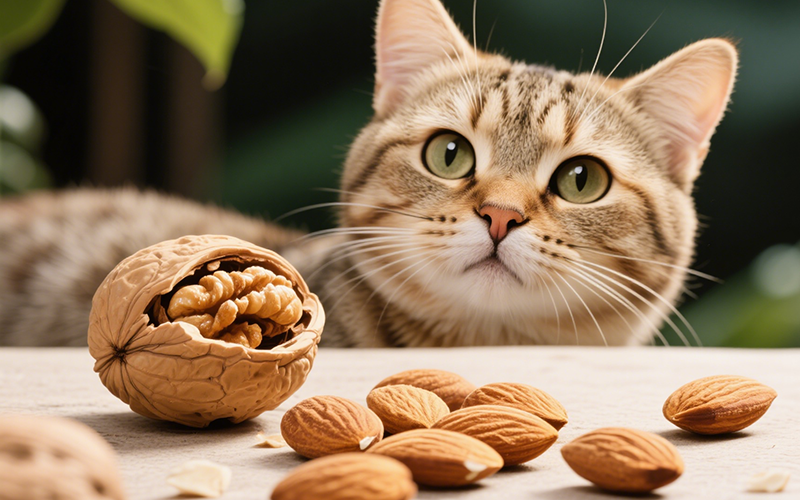
What Are Almonds? A Nutritional Glance (for Humans)
Almonds are the edible seeds of the almond tree (*Prunus dulcis*). While often referred to as nuts, they are technically drupes. For humans, almonds are lauded for their nutritional profile:
Healthy Fats: Rich in monounsaturated fats.
Vitamin E: A potent antioxidant.
Magnesium & Manganese: Important minerals for various bodily functions.
Fiber: Supports digestive health.
Protein: Offer a source of plant-based protein.
Antioxidants: Help protect cells from damage.
This profile makes almonds a valuable part of a human diet. However, these benefits do not translate effectively or safely to the feline digestive system.
Feline Biology: The Obligate Carnivore Perspective
Understanding why almonds aren't ideal for cats requires revisiting their core biological nature. Cats are **obligate carnivores**. This fundamental characteristic dictates their entire nutritional needs:
Meat Dependency:** Their bodies are designed to derive virtually all essential nutrients from animal tissues. They cannot thrive on vegetarian diets.
High Protein Requirements:** They need diets rich in high-quality animal protein, containing specific amino acids like taurine, which are scarce or absent in plants.
Fat Utilization:** Animal fats are a primary energy source and provide essential fatty acids like arachidonic acid, which cats cannot synthesize efficiently from plant precursors.
Limited Carbohydrate Processing:** Their digestive systems are short and lack key enzymes (like salivary amylase and efficient glucuronidation pathways in the liver) needed to effectively digest plant matter, fiber, and complex carbohydrates.
Specific Vitamin Needs:** They require pre-formed Vitamin A (retinol) from animal sources, unable to efficiently convert beta-carotene from plants.
Nuts like almonds, being high in fat (plant-based), fiber, and containing plant protein, simply do not fit this obligate carnivore blueprint.
The Direct Answer: Can Cats Eat Almonds? (Non-Toxic, But Not Recommended)
Let's address the main question clearly:
Not Acutely Toxic (Generally):** Unlike grapes, raisins, chocolate, onions, garlic, or lilies, almonds themselves (specifically sweet almonds, the common edible type) are **not listed as directly toxic** to cats by major poison control centers like the ASPCA. Accidentally ingesting a tiny piece of a plain, unsalted almond is unlikely to cause severe poisoning.
**Strongly NOT Recommended:** Despite the lack of acute toxicity, feeding almonds to cats is **strongly discouraged** by veterinarians due to several significant health risks and a complete lack of nutritional necessity or benefit for felines.
Primary Concerns:** The main dangers stem from their high fat content (risking GI upset and pancreatitis), the potential for choking or intestinal obstruction, and issues arising from added salt or seasonings on flavored almonds.
In essence, while almonds won't poison your cat in the same way antifreeze would, they are an unsuitable and potentially harmful food item best avoided entirely.
Potential (Negligible) Benefits of Almonds for Cats?
Can cats derive *any* benefit from almonds? Realistically, the upsides are practically non-existent and heavily overshadowed by risks:
Protein?:** Almonds contain protein, but it's plant-based and incomplete for a cat's needs, lacking sufficient essential amino acids like taurine.
Fat?:** The fat is primarily monounsaturated (plant-based) and very high. While cats need fat, they require animal fats containing specific essential fatty acids, and the sheer amount in almonds poses health risks.
Fiber?:** The fiber content is more likely to cause digestive upset than provide any significant benefit for a cat's short digestive tract.
There is no nutritional reason to offer almonds to a cat. They get everything they need from a balanced, species-appropriate diet.
MAJOR RISKS: Why Almonds Are Unsafe for Cats
This is the critical information every cat owner needs to understand:
1. Gastrointestinal Upset (High Fat & Fiber)
This is one of the most common adverse effects.
High Fat Content:** Almonds are very rich in fats. A cat's digestive system, while designed for animal fat, can be easily overwhelmed by the concentrated plant fat in nuts, leading to vomiting, diarrhea, abdominal pain, and greasy stools.
Fiber:** The fiber content, beneficial for humans, can be difficult for cats to process, contributing further to digestive upset.
2. Pancreatitis Risk (High Fat Content) - **SERIOUS CONCERN**
Fat as a Trigger:** High-fat foods are a well-known trigger for pancreatitis in both dogs and cats. Pancreatitis is a painful and potentially life-threatening inflammation of the pancreas.
How Almonds Contribute:** The high, concentrated fat in almonds, especially if a cat eats several or consumes almond butter, significantly increases this risk.
Symptoms:** Include severe/repeated vomiting, extreme lethargy, loss of appetite, abdominal pain (hunched posture), dehydration, and sometimes fever or diarrhea. **Pancreatitis requires immediate veterinary intervention.**
3. **Choking Hazard** & Intestinal Obstruction
Size and Hardness:** Whole almonds are hard and awkwardly sized for a cat's mouth and esophagus. They can easily become lodged, causing choking – a veterinary emergency.
Obstruction Risk:** Even if swallowed, a whole or partially chewed almond could potentially cause a blockage further down the digestive tract, especially in smaller cats or kittens. This often requires surgical removal.
4. Salt and Seasonings (Flavored Almonds) - **CRITICAL DANGER**
Almonds prepared for human snacking are often heavily salted or flavored.
Sodium Toxicity (Salt Poisoning):** Cats are extremely sensitive to salt. Flavored almonds (salted, smoked, tamari, etc.) contain dangerous levels of sodium for a small animal. Symptoms include excessive thirst/urination, vomiting, diarrhea, lethargy, tremors, seizures, and potentially death. **Keep salted nuts away from cats.**
Toxic Seasonings:** Many flavored almonds contain **onion powder or garlic powder**, which are **highly toxic** to cats, causing damage to red blood cells (hemolytic anemia). Other spices can also cause severe GI irritation.
Never offer flavored or salted almonds to your cat.
5. Cyanide Concern (Bitter vs. Sweet Almonds - A Nuance)
Important Distinction:** There are two main types of almonds: sweet (the kind we typically eat) and bitter.
Sweet Almonds (*Prunus dulcis var. dulcis*):** These contain negligible amounts of amygdalin, the precursor to cyanide, and are generally considered safe regarding cyanide risk.
Bitter Almonds (*Prunus dulcis var. amara*):** These contain significantly higher levels of amygdalin and **are dangerous** due to the potential for cyanide release when crushed or digested. However, bitter almonds are not typically sold for direct consumption in many places (like the US) due to their toxicity and are mainly used for making extracts (where the cyanide is removed).
Conclusion:** While the cyanide risk from the *sweet almonds* you buy at the grocery store is extremely low to non-existent, it's a factor often mentioned concerning almonds generally. The primary dangers for sweet almonds remain fat, choking, and salt/seasonings.
6. Potential Allergies
While less common than allergies to proteins like chicken or fish, cats can potentially develop allergies to nuts, including almonds. Signs might include skin issues (itching, rashes) or digestive upset.
7. Weight Gain and Obesity
Due to their high fat and calorie density, regularly feeding almonds (even plain ones) can easily contribute to weight gain and obesity in cats, leading to numerous secondary health problems like diabetes and arthritis.
What About Almond Products? Milk, Butter, Flour?
Are processed almond products safer?
Almond Milk for Cats:**
**Safety:** Generally **not recommended.** While lactose-free (unlike cow's milk), many brands contain thickeners (like carrageenan, which is controversial for pets), emulsifiers, added sugars, flavorings, or potentially the deadly sweetener **XYLITOL** (especially in "sugar-free" versions - **check labels meticulously!**).
**Nutrition:** Offers very little nutritional value for a cat (low protein, inappropriate fats).
**Recommendation:** Avoid. Offer fresh water or specific cat milk replacers/supplements if needed.
Almond Butter for Cats:**
**Safety:** **Not recommended.** Extremely high in fat, increasing pancreatitis and obesity risks. Its thick, sticky texture can be a choking hazard or get stuck in a cat's mouth. Often contains added salt, sugar, or potentially **XYLITOL**.
**Recommendation:** Avoid completely.
Almond Flour:** Used in baking. While plain almond flour isn't toxic, baked goods containing it often have other unsafe ingredients (sugar, fat, xylitol, chocolate, raisins). Not suitable for cats.
Accidental Ingestion: What To Do If Your Cat Eats Almonds
If you discover your cat has eaten almonds:
1. Identify Type & Quantity: Was it plain, salted, flavored? Whole or a piece? How many? Was it almond butter or milk (check ingredients for xylitol!)? Note the time.
2. Remove Access: Secure any remaining almonds or products.
3. Monitor Closely:
* **Tiny piece of plain almond:** Monitor for vomiting, diarrhea, or lethargy for 24-48 hours. Ensure water is available. Call vet if symptoms occur.
* **Whole plain almond:** Monitor for GI upset AND signs of potential obstruction (repeated vomiting, straining, abdominal pain, lethargy). Call vet for advice. Choking is an immediate emergency.
* **Salted/Flavored Almonds:** **Call your vet or Pet Poison Helpline immediately** due to salt/seasoning toxicity risk.
* **Almond Butter/Milk:** **Check for XYLITOL.** If present or suspected, **IMMEDIATE EMERGENCY VET VISIT.** If no xylitol, monitor for GI upset/pancreatitis signs; call vet if concerned or large amount eaten.
4. Do NOT Induce Vomiting:** Unless directed by a vet. Skip the nuts and choose treats that are actually good for your cat: Small Pieces of Plain Cooked Meat:** Unseasoned chicken, turkey, lean beef, lamb, fish (boneless). High-Quality Commercial Cat Treats:** Meat-based, low-calorie options. Freeze-Dried Meat Treats:** Single-ingredient protein snacks. Lickable Treats / Meat Pastes:** Fun and palatable. Dental Treats:** Designed for oral health. Cat Grass:** Safe greens for nibbling. The veterinary community consistently advises against feeding almonds to cats: While sweet almonds are **not acutely toxic**, they are nutritionally inappropriate for obligate carnivores. The **high fat content** poses significant risks of **gastrointestinal upset and potentially fatal pancreatitis**. **Whole almonds are a serious choking and obstruction hazard**. **Salted and flavored almonds are dangerous** due to sodium toxicity and potentially toxic seasonings (garlic, onion). Almond milk and butter are also unsuitable due to fat, additives, and potential xylitol content. Stick to balanced commercial diets and species-appropriate treats. The professional advice is clear: the risks associated with almonds far outweigh any potential benefits for cats. Navigating the complexities of what's safe for your cat, like understanding the risks of almonds, is crucial. If your cat ingests something potentially harmful or shows concerning symptoms, getting reliable information quickly can be invaluable while you contact your veterinarian – your primary resource for diagnosis and treatment. The PettureX App provides innovative tools for pet parents: 24/7 AI Vet Consultation: Get immediate AI-powered answers to urgent questions about food safety ("My cat ate a salted almond, what do I do?") or symptoms like vomiting or choking, helping you assess the situation's urgency. Image Recognition Technology: Useful for breed identification or getting preliminary insights into visible health concerns. AI-Powered Symptom Checker: Input your cat's symptoms for an AI analysis of potential causes, including dietary indiscretion, pancreatitis, or toxicity, aiding effective communication with your vet. Comprehensive Pet Health Database: Quickly access information on toxic foods, common feline illnesses, first aid awareness, and preventive care. PettureX serves as a helpful digital assistant, offering convenient AI-driven support and information to complement the essential, personalized care provided by your veterinarian. In conclusion, while sweet almonds are not directly toxic to cats, the answer to "can cats eat almonds?" is a strong recommendation to avoid them entirely. The potential risks – including severe gastrointestinal upset, life-threatening pancreatitis from high fat content, choking or obstruction hazards, and toxicity from salt or seasonings on flavored varieties – far outweigh any negligible nutritional benefit for an obligate carnivore. Protect your cat's health and safety by keeping almonds and almond products (milk, butter) securely away from them. Choose treats specifically designed for feline nutritional needs and biological makeup. If accidental ingestion occurs, contact your veterinarian immediately for guidance based on the specific situation. When it comes to nuts like almonds, it's always wisest to prioritize your cat's well-being and stick to species-appropriate options.Safer Snack Options for Your Feline Friend
Expert Veterinary Opinion on Almonds for Cats
Summary Table: Cats and Almond Safety
Aspect Safety Information & Recommendations Can Cats Eat Almonds? Non-toxic (sweet almonds), but **NOT recommended** due to significant health risks. Primary Risks **High Fat** (GI Upset, Pancreatitis), **Choking/Obstruction** (Whole Almonds), **Salt/Seasonings** (Flavored Almonds - Toxicity). Nutritional Value for Cats Negligible. Nutritionally inappropriate (plant protein/fat, fiber). Cyanide Risk Extremely low for common sweet almonds. High for rare bitter almonds. Not the primary concern for edible almonds. Almond Milk Not recommended. Low nutrition, potential additives (thickeners, sugar, **XYLITOL risk**). Almond Butter Not recommended. Very high fat, choking/stickiness hazard, potential added salt/sugar/**XYLITOL**. Flavored/Salted Almonds **DANGEROUS.** High risk of salt toxicity and toxic seasonings (onion/garlic). Avoid completely. Action if Eaten Plain (Tiny): Monitor. Whole/Large Amount/Flavored/Butter/Milk: Call Vet/Poison Control immediately. **Check for XYLITOL -> EMERGENCY.** Recommendation **Avoid feeding almonds** and almond products to cats. Choose safe, species-appropriate treats. Need Quick Pet Health Information? PettureX Offers Support!
Conclusion: Almonds Are Best Left as Human Snacks, Not Feline Treats
Related
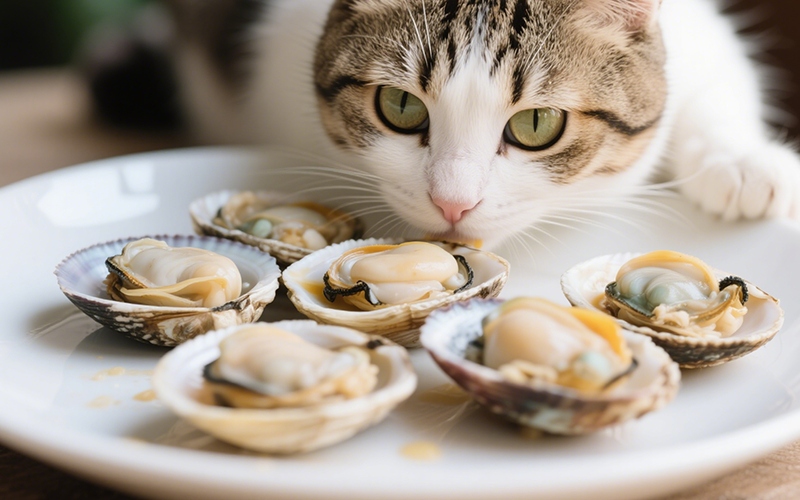
Seafood Surprise: Can Cats Eat Clams Safely? (Vet-Reviewed Risks & Guide)
- 15 Apr 2025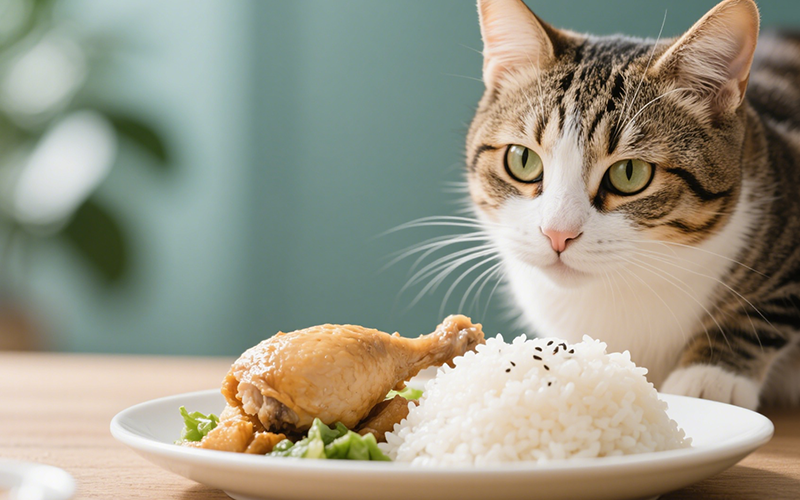
Chicken & Rice for Cats: Safe Treat or Dietary Danger? (Vet-Reviewed Guide)
- 15 Apr 2025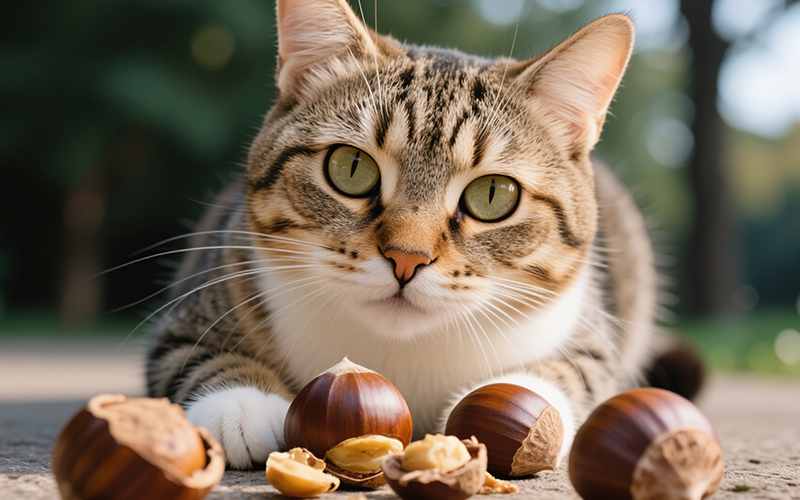
Nutty Concerns: Can Cats Eat Chestnuts Safely? Vet Explains the Risks (True vs. Horse Chestnuts)
- 15 Apr 2025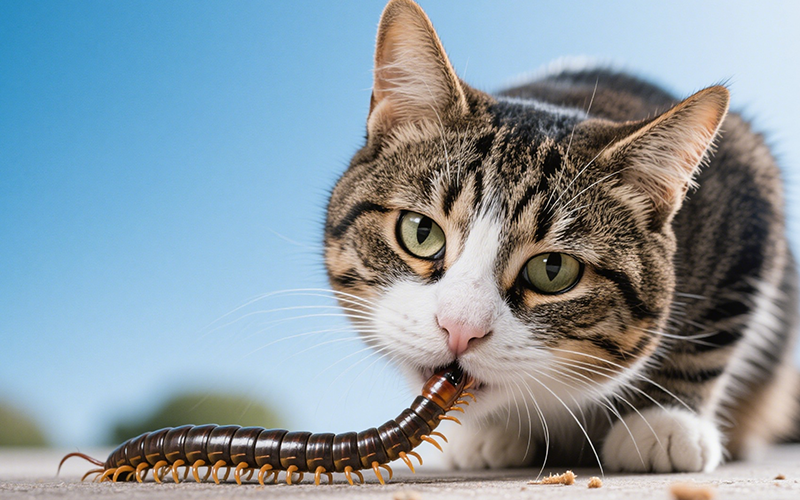
Creepy Crawly Cuisine? Can Cats Eat Centipedes Safely? (Vet-Reviewed Warning)
- 15 Apr 2025
The Gourd Guide: Can Cats Eat Canned Pumpkin Safely? Vet-Reviewed Benefits & Risks
- 15 Apr 2025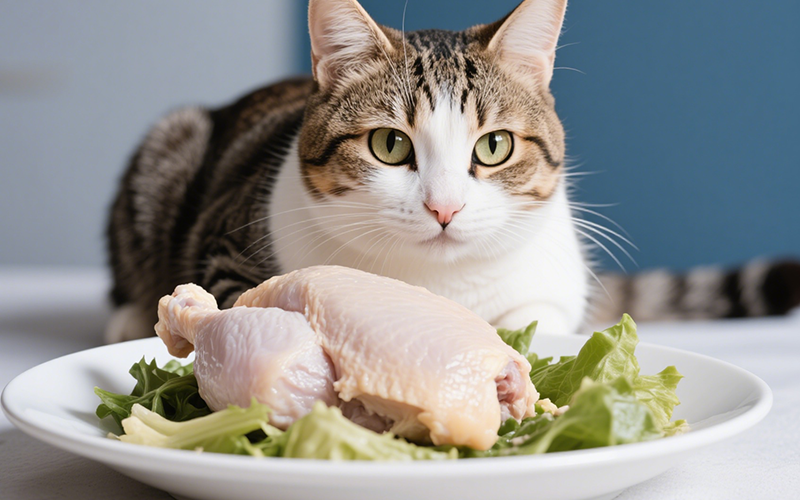
Boiled Chicken for Cats: A Purrfectly Safe Treat or Potential Pitfall? (Vet-Reviewed Guide)
- 15 Apr 2025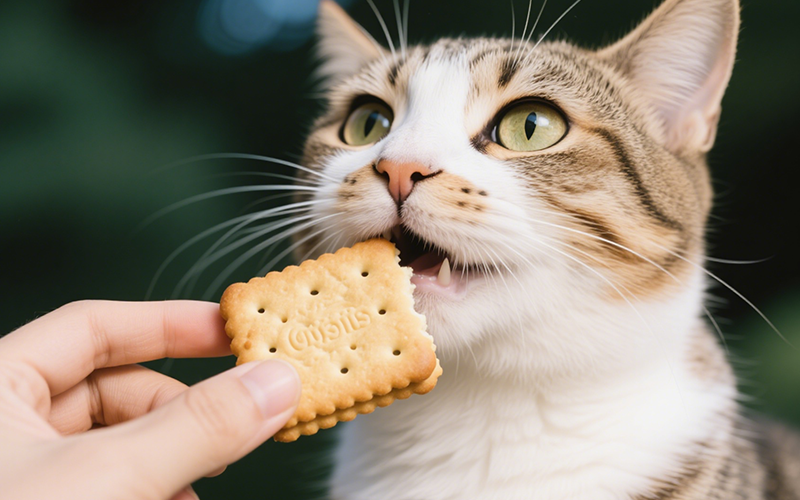
The Crumbly Truth: Can Cats Eat Biscuits Safely? Vet Warns of Hidden Dangers
- 15 Apr 2025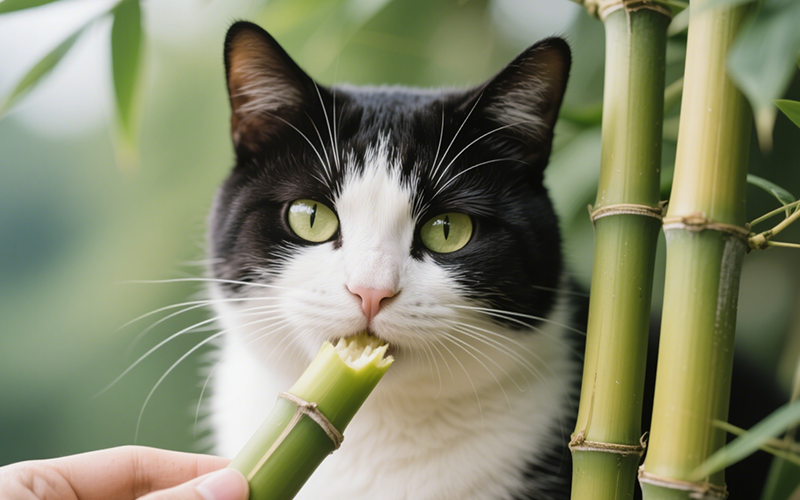
Green Stalks & Curious Cats: Can Cats Eat Bamboo Safely? (Vet-Reviewed Guide)
- 15 Apr 2025
Beef Liver for Cats: Nutrient Powerhouse or Risky Treat? (Vet-Reviewed Safety Guide)
- 15 Apr 2025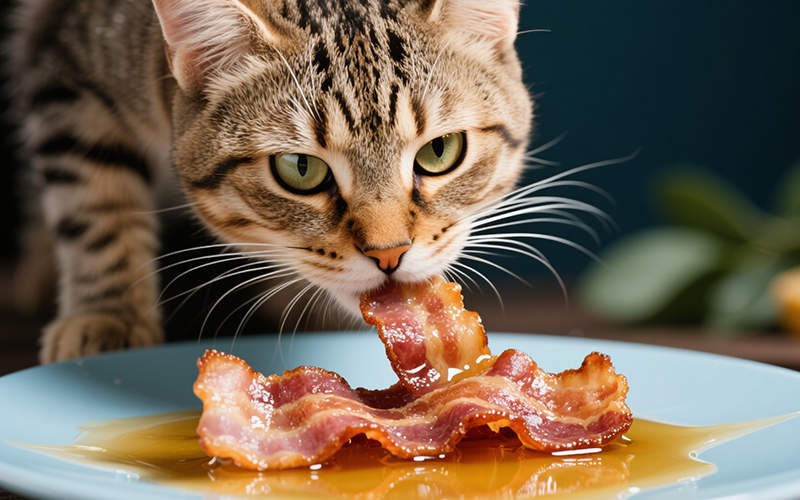
Fat Trap Alert: Can Cats Eat Bacon Grease Safely? (Vet-Reviewed Dangers)
- 15 Apr 2025
